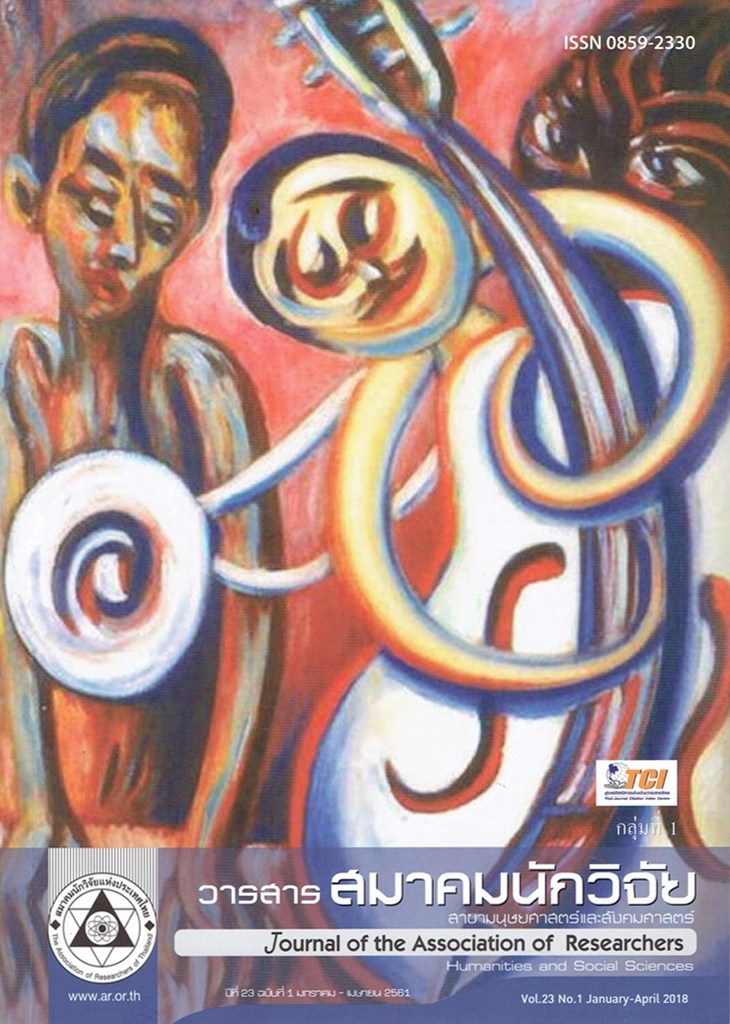Influences of Motivation and Perception of Organization Climate toward Individual Behavior of Warehouse Division’s Staff on King Power Group
Main Article Content
Abstract
The objectives of this research were 1) to study the level of working motivation, perception of organization climate and individual behavior of warehouse division’ staff on King Power Group 2) to study of the structural relationship among working motivation, perception of organization climate and individual behavior of warehouse division’ staff on King Power Group 3) to study the influence of working motivation and perception of organization climate toward individual behavior of warehouse division’ staff on King Power 4) to study the influence of working motivation toward individual behavior of warehouse division’ staff on King Power by perception of organization climate. A research tool is the questionnaires with the confidence index of 0.92 to study the sample group of 433 staffs of warehouse division on King Power Group. The research results were as follows 1) the mean level of working motivation, perception of organization climate and individual behavior were high level at 3.80, 3.78 and 3.85 respectively 2) working motivation was positively related to perception of organization climate at the statistical significance 0.833 (p<0.01) while perception of organization climate was positively related to individual behavior at the statistical significance 0.494 (p<0.01) and working motivation was positively related to individual behavior at the statistical significance 0.546 (p<0.01) 3) working motivation influenced on individual behavior at the statistical significance 0.439 (p<0.01) and perception of organization climate influenced on individual behavior at the statistical significance 0.128 (p<0.05) 4) working motivation influenced on individual behavior by perception of organization climate in low level at the statistical significance 0.107 (MOV → PER → BEH, γβ(0.439X0.128) = 0.107, p < 0.05) R2 = 0.303 means that 30.30 percent of variance on individual behavior can be explain and predict by working motivation
Article Details
บทความที่ปรากฏในวารสารนี้ เป็นความรับผิดชอบของผู้เขียน ซึ่งสมาคมนักวิจัยไม่จำเป็นต้องเห็นด้วยเสมอไป การนำเสนอผลงานวิจัยและบทความในวารสารนี้ไปเผยแพร่สามารถกระทำได้ โดยระบุแหล่งอ้างอิงจาก "วารสารสมาคมนักวิจัย"
References
รุ่งรดิศ คงยั่งยืน. (2560). “องค์การแห่งการเรียนรู้ บรรยากาศองค์การ พฤติกรรมการเป็นสมาชิกที่ดีขององค์การและการแบ่งปันความรู้ของหน่วยงานในฝ่ายช่าง บริษัทการบินไทย จำกัด (มหาชน)” วารสารสมาคมนักวิจัย. 20(3), 150 – 162.
อรุณ รักธรรม, กุลธน ธนาพงศธร, ธนชัย ยมจินดา. (2538). พฤติกรรมมนุษย์ในองค์การ. นนทบุรี: มหาวิทยาลัยสุโขทัย ธรรมาธิราช.
References
Clayton P. Alderfer. (1972). Existence, Relatedness and Growth: Human Needs in Organizational Setting. New York: Free Press.
Hooper, D., J. Coughlan and M. R.Mullen. (2008). Structural Equation Modelling: Guidelines for Determining Model Fit. Electronic Journal of Business Research Methods 6(1): 53-60.
Kongyungyune, Rungradit. (2560). “Learning Organization, Organizational Climate, Organizational Citizenship Behavior and Knowledge Sharing of Subunits within Technical Department Thai Airways Public Company Limited” Journal of the Association of Researchers. 20(3), 150 – 162 (in Thai).
Likert R. (1967). The Human Organization: its Management and Value. New York: McGrow-Hill Book Company.
Meejaisue, Prayong. (1998). Organizational Behavior. Department of Administration. Faculty of Business Administration. Ramkhamhaeng University. (in Thai).
Raktham Arun, Thanaphongsathorn Kulthon and Yomjinda Thanachai. (1995).
Human Behavior in Organization. Department of Management. Sukhothai Thammathirat Open University. (in Thai).
Schsermelleh-Engel, K., H. Moosbrugger, and H. Muller. (2003). Evaluating the Fit of Structural Equation Models: Tests of Significance and Descriptive Goodness-of-Fit Measures.
Methods of Psychological Research. 8(2): 23-74. Stringer, R. (2002). Leadership and Organization Climate. The Cloud Chamber effect. New Jercy: Prentice Hall.
Tiyaboodh, Chorladda. (2013). Business Psychology. Bangkok. (in Thai).


